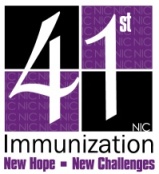
|
|
CDC NIP/NIC Home Page
|
Monday, March 5, 2007 - 4:05 PM
16
Migrant and Seasonal Farmworker Immunization Project: Delivering Immunizations to a High-Risk, Mobile Population
Valerie L. Polletta and Virginia Lewkowicz. Immunization Program, New York State Department of Health, Empire State Plaza, Corning Tower, Room 678, Albany, NY, USA
Learning Objectives for this Presentation:
1. By the end of the presentation, participants will be able to identify and address challenges to delivering immunizations to adult migrant and seasonal farmworkers (MSFWs).
2. By the end of the presentation, participants will be able to implement effective methods to overcome challenges to immunizing adult MSFWs.
3. By the end of the presentation, participants will be able to understand the key role that community partnerships play in improving vaccine delivery.
Background:
The living and working conditions of migrant and seasonal farmworkers (MSFWs) place them at high risk for vaccine-preventable diseases. In 2003 the New York State Immunization Program implemented the MSFW Immunization Project to improve the immunization coverage levels of this vulnerable population. The Project currently supplies free vaccine to 25 provider sites serving adult MSFWs and their family members in 27 out of 57 Upstate New York counties. A primary focus of the Project is to improve immunization education and enhance delivery of immunizations to this population by developing partnerships and promoting collaborative efforts in the MSFW community.
Setting:
County health departments, migrant/community health centers, private physician offices, hospitals, community-based organizations, and others
Population:
Adult migrant and seasonal farmworkers and their family members
Project Description:
Public health professionals are provided with a presentation that will introduce the process of integrating a successful adult immunization initiative among MSFW providers. We will share successful methods used by Project participants to address the unique needs of the MSFW population, and demonstrate the importance of establishing strong partnerships.
Results/Lessons Learned:
Public health professionals will identify barriers to immunization and learn about successful clinic models that have improved MSFWs' access to immunizations.
See more of Approaches to Promoting Adult Vaccination
See more of The 41st National Immunization Conference (NIC)
See more of The 41st National Immunization Conference (NIC)